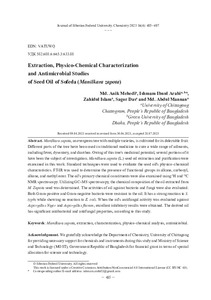Extraction, Physico- Chemical Characterization and Antimicrobial Studies of Seed Oil of Sofeda (Manilkara zapota)
Автор:
Md. Anik Mehedi
Ishmam Ibnul Arabi
Zahidul Islam
Sagor Das
Md. Abdul Mannan
Мд. Аник Мэеди
Ишмам Ибнул Араби
Захидул Ислам
Сагор Дас
Абдул Маннан
Дата:
2023-12Журнал:
Журнал сибирского федерального университета. 2023 16(4). Journal of Siberian Federal University.Chemistry 2023 16(4)Аннотация:
Manilkara zapota, an evergreen tree with multiple varieties, is cultivated for its delectable fruit.
Different parts of the tree have been used in traditional medicine to cure a wide range of ailments,
including fever, dysentery, and diarrhea. Owing of this tree's medicinal potential, several portions of it
have been the subject of investigation. Manilkara zapota (L.) seed oil extraction and purification were
examined in this work. Standard techniques were used to evaluate the seed oil's physico- chemical
characteristics. FT-IR was used to determine the presence of functional groups in alkane, carbonyl,
alkene, and methyl ester. The oil's primary chemical constituents were also examined using 1H and 13C
NMR spectroscopy. Utilizing GC–MS spectroscopy, the chemical composition of the oil extracted from
M. Zapota seed was determined. The activities of oil against bacteria and fungi were also evaluated.
Both Gram-positive and Gram-negative bacteria were resistant to the oil. It has a strong reaction to S.
typhi while showing no reaction to E. coli. When the oil's antifungal activity was evaluated against
Aspergillus Niger and Aspergillus flavum, excellent inhibitory results were obtained. The derived oil
has significant antibacterial and antifungal properties, according to this study Manilkara zapota, вечнозеленое дерево с множеством разновидностей, выращивается
из-за его восхитительных плодов. Различные части дерева использовались в традиционной
медицине для лечения широкого спектра заболеваний, включая лихорадку, дизентерию и диарею.
Из-за целебных свойств этого дерева несколько его частей были предметом исследования.
В данной работе были рассмотрены вопросы экстракции и очистки масла из семян Manilkara
zapota (L.). Для оценки физико-химических характеристик масла из семян были использованы
стандартные методы. FT-IR использовали для определения присутствия функциональных
групп в алкане, карбониле, алкене и метиловом эфире. Основные химические компоненты
масла также были исследованы с помощью ЯМР-спектроскопии 1Н и 13С. С помощью GC–MS
спектроскопии был определен химический состав масла, извлеченного из семян M. Zapota. Также
была оценена активность масла в отношении бактерий и грибков. Как грамположительные, так
и грамотрицательные бактерии были устойчивы к маслу. Оно обладает сильной реакцией на S.
typhi, но не проявляет никакой реакции на E. coli. Когда была оценена противогрибковая активность
масла в отношении Aspergillus Niger и Aspergillus flavum, были получены отличные результаты
ингибирования. Согласно этому исследованию, полученное масло обладает значительными
антибактериальными и противогрибковыми свойствами

